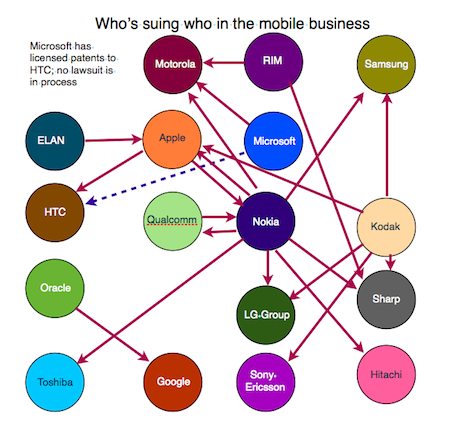
*Chart compliments of The Guardian
If you've kept up with techie news lately, you'll notice that patent lawsuits have become the cost of doing business. Oracle & Google are going toe-to-toe for who owns the soul of the Android Operating system, while Microsoft is suing Motorola for patent infringement along with anyone else who comes marginally close to existing patents. Meanwhile, Apple is defending itself from a several major class action lawsuits for a variety of different issues. So what does that mean for you, me, and the other millions of people who purchase phones from these companies and service providers?
We can expect several changes in the technology industry as whole, as well as broader effects on the US economy. The biggest issues, in my opinion, are: an imposed penalty on innovation, an increased reluctance for foreign investors to invest in US companies, and the long term infeasibility of small medium sized businesses to compete. Unfortunately, this isn't a new story, but one that's been in the works for decades in this country. Let's take a quick look at each of these issues and briefly discuss each of them.
Damn you, you innovating innovator you
This past week, Motorola filed a lawsuit against Apple for over 18 different patents. These lawsuits include technologies such as location-based services, wireless e-mail, and antenna design (Apple = double fail) and touch just every product Apple has released within over the past 4 years. The validity of Motorola's claims requires much more legal knowledge than I possess, but then again, the only people who do understand the true details of these claims are the teams of lawyers employed by either side. Whether or not these claims are in fact valid, begs the point, if Motorola owned all this intellectual property, then why didn't they use it? Maybe it was because they were producing versions 6, 7, and 10 of the RZR.

Motorola and the RZR circa de 2004-2007 (an artists' rendition)
Quite frankly, the ability for a corporation to dream up a vague patent, sit on it for years and years, and then get pissed when someone moves forward with anything tangentially related, reminds me of being 6 years old and licking my ice cream cone before my friend could steal a bite.
On a broad level, we are punishing the innovators, and rewarding the slackers. If you've followed Motorola over the last several years, you can see that they've clearly struggled with innovation (the Q and the latest Android Backflip are great examples of market flops). So what do you do when you can't grab market share? You sue the person that has it.
Who Cares – Lawsuits are just a part of doing business
Not quite true. As you probably know, the US is the most litigious company, er country, in the world. The knee-jerk reaction to sue seems to be quite unique to the United States. While legal costs in most Western European countries are around 0.5%-0.7% of GDP, lawsuits account for nearly 1.8% of Gross Domestic Product (GDP) in the US (almost $252 billion) (source: European Business Review). Of course calling this "product" is laughable – it's not like China will start importing lawyers from the US. While companies like Microsoft and Motorola are spending time suing the pants off each other, less silicon chips are being produced and we give more opportunity to developing countries to take our already dulling edge.
What does a sue-happy US mean to the rest of the world? The most sobering answer is a decrease in foreign investment. The US Department of Commerce recently listed our legal system as a chief detracting reason for companies looking to expand in the US. This is understandable, as the more resources a company must devote to legislation, the less it has to spend on operations.
This decrease in foreign investment ultimately hurts the US workforce as less money from overseas is available. And don't even get me started on how much money we already owe the rest of the world.
Ma and Pa Can't Create
One of the greatest facets of the United States is how easily a citizen can start his or her own businesses compared to nations around the world. Start-up costs are notoriously large in countries like Greece and the Netherlands where red-tape involved with creating a business entity can be endless (even after you pay off the local officials). As the US continues to foster an environment which prohibits entry to market by smaller competitors, we continue the path towards a privately held oligarchy consisting of a small number of big players with significant political and economic influence. Depending on your own political ideologies, you may argue that we have already reached this point – in which case I would agree with you.
However my point here is not to observe how bad things currently are, but rather demonstrate that things will get much worse if American business continues to use litigation as a business strategy. The free market is still alive in the US, and I hope it still will be by the time I retire.
So What's Next?
None of the issues I discuss here can be fixed easily and will a take significant amount of legislation to solve. This work ultimately will need to come in the form of politically involved citizens or whichever corporation-driven political party is managing our country (don't hold your breath). As our nation's companies continue to use litigation as a business strategy, we will continue to see innovators punished for game-changing ideas, foreign countries invest more of their assets into other foreign nations, and small to medium size businesses fail to compete in an inhospitable business environment.
I hope there's a happy end to this story – I truly do. However as it currently sits, this problem is far down the list of political party agendas and will not likely be addressed until the problem is too late.
